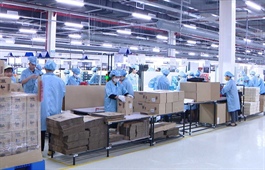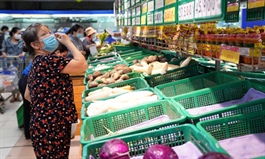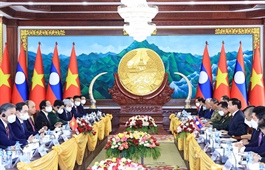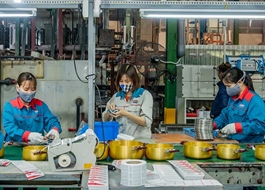Viet Nam, US eye sustainably equal trade ties
Viet Nam, US eye sustainably equal trade ties
Since the normalisation of bilateral relations in 1995, economic and trade ties between Viet Nam and the US have seen great progress, with two-way trade hitting an all-time high of US$90.8 billion in 2020, up 19.8 per cent year-on-year, despite serious impacts of the COVID-19 pandemic. 
US Vice President Kamala Harris’s visit to Viet Nam is expected to open up new business and investment opportunities for the two countries’ enterprises.
According to the Vietnamese Ministry of Industry and Trade (MoIT), since the Viet Nam - US Bilateral Trade Agreement (BTA) took effect in December 2001, two-way trade has continuously increased.
The US continued to be Viet Nam's largest importer in the first seven months of this year with a turnover of $53.7 billion, up 37.7 per cent year-on-year.
Viet Nam mainly shipped machinery, equipment, tools and spare parts to the US. Therefore, despite being affected by the pandemic, the country's revenue from exporting these items to the US still reached $12.2 billion last year, up 141.5 per cent compared to 2019. In the 2016-20 period, exports of these products to this market enjoyed an annual average growth rate of 54.8 per cent.
According to insiders, this confirms that Viet Nam has become an important link in the supply chains of many products to many markets, including the US.
Deputy Minister of Industry and Trade Do Thang Hai said that the Vietnamese and US economies are complementary. In the future, Viet Nam will continue speeding up its economic reform and international integration, and strengthen mutually-beneficial economic, trade and investment cooperation with the US.
According to the Deputy Minister, the value of imports from the US will increase through the improvement of Viet Nam’s business environment, thereby attracting more enterprises to Viet Nam.
The US’ becoming Viet Nam's largest export market is considered a positive signal. However, the Viet Nam Trade Office in the US recommended Viet Nam be careful about anti-fraud and trade protection issues.
Phan Mai Quynh from the MoIT's Viet Nam Trade Remedies Authority said that in order to avoid risks, businesses should actively answer questions from the investigation agency, and fully prepare documents as required, and build an advanced governance system.
To support businesses in boosting exports to this market, Viet Nam will continue cooperating with US partners to comprehensively address the US' concerns.
The MoIT is working on big projects to enhance the competitiveness of export products, Hai said, adding that businesses must actively develop their markets to improve their domestic production capacity and integrate deeper into the global supply chains.



























